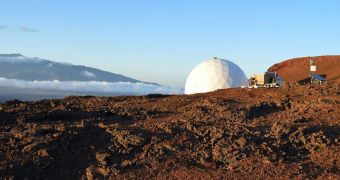Over the past few years, the necessity of sending people to Mars has been made obvious, and numerous initiatives, both public and private, have emerged to compete for this goal. The Mars One project is such an effort, but it may already have a leg up on its competition. Here is why.
Unlike other companies contemplating missions to the Red Planet, Mars One will not return its crew home. Any astronaut that will fly to Mars on the company's future spacecraft will remain on our neighboring world forever, or at least until economically feasible means of returning them to Earth are developed, tested, and commissioned.
NASA, for example, has been instructed by US President Barack Obama a few years back to put people in orbit around Mars by the mid-2030s, with a manned mission to follow later on. However, the agency has to develop a mission that would see crew members safely returning to Earth after a while.
The Netherlands-based nonprofit Mars One will not have this concern in mind while developing its manned missions to Mars. Their goal is to create a permanent and sustainable human settlement on our neighboring planet by 2025. Robots will naturally lead the way before the first humans depart.
The automated workers will be responsible for building a livable habitat, and for stockpiling as much water as possible. This simple chemical can be used for drinking, or to create air and rocket fuel.
Despite the potential for extreme Martian weather or exposure to lethal doses of radiations, both on Mars and on spacecraft flying to the Red Planet, more than 200,000 people have already signed up for the chance to be on one of the company's fights, NPR reports.
“Everything I have done academically and professionally has been for one reason: to leave this Earth and represent humanity on Mars,” explains Lt. Heidi Beemer, 25, one of the 1,000 people who have been selected by Mars One for the second round of tests.
“I actually decided and told my parents when I was 8 years old that I was going to be an astronaut and go to Mars,” says the US Army chemical defense officers, who is currently stationed with the 63rd Chemical Company at Fort Campbell, Kentucky.
“The thought of being afraid or having the fear of the fact that I'm going to die on a different planet doesn't really bother me, because this is something that will help out humanity for years and years to come,” she concludes.

 14 DAY TRIAL //
14 DAY TRIAL //